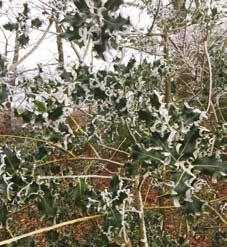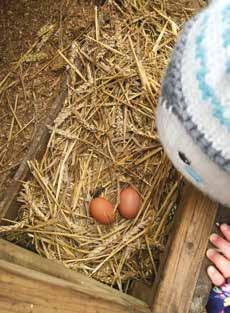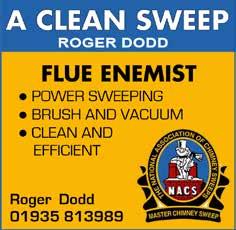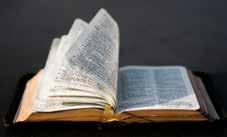
3 minute read
POGLES WOOD EXPLORERS
Despite all the dismal news, we have had some sparklingly beautiful days already this month. When I last wrote I had hoped that by now we would be looking forward to a whole new programme of activities and all our school children would be back, bright eyed and bushy tailed after Christmas! Hey ho!
So, once again. I cannot say what will happen or when our regular sessions will resume. I am not planning any holiday club activities for the February half term. Rest assured that while we have no visitors to cheer us, we are getting on with jobs. We have nearly finished the shelter make over and have thinned some trees and are just about to plant a few new ones to replace the ones sadly lost to ash dieback. As the days get longer, we can start to do some work in the growing area and we still have a few brambles that need a good bashing.
Advertisement
Please keep safe, get plenty of fresh air and keep an eye on the Facebook page for up to date information.
Philippa Toulson
philippa.toulson@gmail.com Facebook: Pogles Wood Explorers















“Always laugh when you can” said Lord Byron ‘It is cheap medicine’. In that spirit and with the caveat that recommending a personal choice of ‘the funniest books’ is a risky business,here are ten equilibrium restoring long time favourites.
We have to start with Evelyn Waugh. His six early novels are surely the most skilfullyfunny in the English language and Scoop is the funniest. Set in the midst of an African war (Waugh drew on his own experiences as a Daily Mail
correspondent in Abyssinia) its withering satire of newspaper magnates of the day (Rothermere, Northcliffe and Beaverbrook) and of tabloid idiocies and excesses is irresistible. Close behind must come his Decline and Fall and Vile Bodies, the latter featuring an MP called Walter Outrage, a Lady Throbbing, the society hostess Margot Metroland, and an American evangelist, Mrs Melrose Ape. The unique chapter 11 comprises just 47 lines; 173 perfect words of genius and pathos in equal measure.
One of the best of PG Wodehouse’s comic classics is Code of the Woosters. Bertie Wooster finds himself in conflict with Roderick Spode (a thinly disguised Oswald Mosley, leaderof the Fascist ‘Blackshirts’ in the 1930s). Wooster’s friend Gussie Fink-Nottle explains Spode’s movement to him: Wooster: when you say blackshorts you mean shirts of course.. Fink-Nottle: No. There were no shirts left. Spode and his adherents wear shorts. Wooster: Footer bags you mean? Fink-Nottle: Yes Wooster: How perfectly foul.
Nora Ephron, creator of marvellous screenplays (When Harry met Sally, Sleepless in Seattle) produces sparkling dialogue and killer one-liners in the partially autobiographical Heartburn. If you can’t laugh reading Mario Vargas Llosa’s Aunt Julia and the Scriptwriter, you need to see your GP. Onto the list must go What a Carve Up by Jonathan Coe; Porterhouse Blue by Tom Sharpe and Wonder Boys by Michael Chabon.
The best is left to last: Joseph Heller’s irrepressible Catch 22, set in WW2. Doc Daneeka explains to hapless flyer Yossarian that he cannot be let off more missions because of his mental state.
Yes, hewould be crazy to fly moremissions andtherefore didn’t have to, but if he didn’t want to he was sane and had to. “That’s some catch, that Catch 22” observes Yossarian, deeply impressed by the genius of Catch 22. “It’s the best there is” Doc replies. And so is the book.










